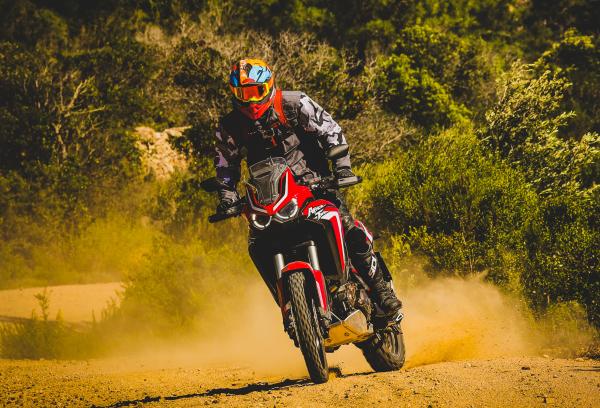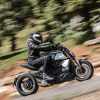
Visordown tests the new Honda CRF1100L Africa Twin DCT (2020) both on and off-road; Here’s what we think of the lighter and more powerful Africa Twin.
After a day of riding around Sardinia on the fully kitted out Adventure Sports DCT ES, it was time to hop on the lighter, off-road-focused, CRF1100L. With its tubed nobbly continental tyres and rally styled bodywork, fun times were ahead. And plenty of powerslides too.
The majority of the day was spent off-road, where the new Africa Twin is right at home. So, that’s what this review will focus on. Check out the full review on the Adventure Sports model if you’re interested more in the road handling.
To me, the new CRF1100L harkens back to the original RD-03 Africa Twin, inspired by the NXR750 Dakar winning race bike. It has a focus and precision which is hard to not be won over by and is 5 kg lighter than before. Although, it's not lighter on your wallet...
Price
The CRF1100L is packed out with cutting edge technology which comes at a cost when compared to the previous model Africa Twin.
Honda CRF1100L Africa Twin – £13,049
Honda CRF1100L Africa Twin DCT – £13,949
Engine, transmission and exhaust
The reworked cylinder head, improved valve timing, throttle body and exhaust control valve [nicked off the CBR1000RR] enable 101hp from the 1084cc 270° parallel-twin engine. The torque sees a 7% improvement on the last model @105Nm.
The torque is smooth and consistent from idle right up to the redline. It's got a strong focused character with a couple of bumps of torque at 4k and 6k. And the joystick-like DCT triggers on the LH switchgear make the acceleration consistent and seamless. Like most parallel-twin motors the engine is silky smooth, and mega predictable off-road - great for technical and slippery trails where throttle accuracy is important. And great for whipping the tail out.
The DCT system, though massively improved [and linked to the six-axis IMU], felt a little jerky on very technical sections of trail, and required a dab of rear brake on pull away to smooth out the initial throttle input. It’s not bad by any stretch of the imagination but could be slightly refined. However, if you’re all about offroading then the manual variant would be a better option. If you’re not an expert on the rough stuff, then the DCT system allows you to focus on the path ahead and not worry about simultaneously coordinating all four limbs at once.
The exhaust note - thanks to the control valve - is delightful. It’s got a deep bellow and sounded the dog's bollox as the guide riders ripped it up the gravel trails - rear wheel spinning, throttle pinned. Awesome stuff!
Chassis and Suspension
The semi-double-cradle frame has been modified to reduce weight and the new engine components and redesigned cases, the bike is 5kg lighter. The rear swingarm is inspired from the CRF450 MX bike in order to make the AT more nimble off-road.
Green = Old
Red = New
The fully adjustable 45mm Showa Front suspension is plush and makes the bike feel connected to the surface. The rear fully adjustable Showa Pro-Link monoshock (with gas bottle) has 220mm of wheel travel. The suspension coped very well with the rough ‘road’ conditions, and the feeling the package provides to the rider is direct and reassuring. At no point did the bike lack feeling or responsiveness. Which is pretty good going for a 226kg machine on gravel and dirt.
For more extreme Dakar styled conditions and jumps I can’t comment on how the suspension would perform. Chances are it would be sweet as a nut though.
Handling
In short, the handling is super composed. It’s nearly impossible to tie the bike in knots, impart due to the electronics and epic two-channel ABS system, but also down to the frame and suspension geometry. It’s almost a point a squirt kind of ride, and the more relaxed and positive you are with control inputs the better it responds.
Off-road, rear-wheel steering becomes second nature, and on my brief time on the road, the Continental nobbly tyres held up just fine. Granted, you can’t ask too much of them - especially on corner exit at lean - but at non-competitive speeds, they are fine.
In my mind, the less you think about wanting to adjust suspension, preload, and rebound, the better. With the Africa Twin, I just wanted to get on and ride into the sunset. Whatever terrain is chucked in its path it just seems to calmly and efficiently overcome, and ask for more.
So. Much. Fun.
Brakes
At the front is a 310mm dual wavey floating hydraulic disc with two Nissin radial mounted 4-piston calipers. The rear has a large 256mm wavey hydraulic disc with a Tokico single piston caliper. Both front and rear brakes have a two-channel ABS system with cornering ABS. This system is one of, if not, the most refined system I’ve ever had the pleasure of using. Trust me, it saved my bacon countless times off-road and can be a reassuring assistant when the rider [me] is a little out of their depth.
Comfort and ergonomics
Off-road you hardly use the seat, although it’s very supportive. The handlebars could do with tilting forward a few degrees to allow for a slightly more natural stand up riding position. And the rear brake lever needs to be lowered 5mm to feel natural in MX boots. Very small changes required - mostly personal preference.
In general, the Africa Twin is very comfortable and untaxing to ride, due to superb flickability and an empowering 90° upright seating position.
Equipment
The main improvements include a six-axis IMU which communicates with the 7 levels of Honda Selective Torque Control (HSTC), with four power levels and three levels of electronic engine braking. 3 levels of wheelie control has also joined the party.
Standard Equipment on CRF1100L
6.7” touch TFT dash and LCD lower panel
6 Axis IMU
ABS and cornering ABS
7 levels of Honda Selective Torque Control
Wheelie control
Daytime running lights
LED headlights and taillight
Apple CarPlay + Bluetooth
And more buttons than the space shuttle…
Riding modes
Power | Engine braking | ABS | G Switch | HSTC | Wheelie | ||
TOUR | 1 | 2 | On road | Not active (Default) | Adjustable | Adjustable | |
URBAN | 2 | 2 | On road | Not active (Default) | |||
GRAVEL | 4 | 3 | Off road | Not active (Default) | |||
OFF-ROAD | 3 | 3 | Off road | Active (Default) | |||
USER 1 USER 2 | 1-4 | 1-3 | On road or Off road | Free to choose | |||
Navigation of these modes on the LH switchgear does take a while to get used to. To nitpick, the indicator stalk isn’t obvious enough from the DCT gear selector either. Although I’m not that greatest at multi-tasking, so I can be easily confused.
The self-cancelling indicators aren't the greatest either, but you can turn off this function via the dash.
We love:
· Build quality and attention to detail
· On and off-road handling capability
· Electronics package
· Empowering riding position
We don’t love:
· Indicator stalk design
· Dash takes too long to load
· Startup safety warning on touch screen each time bike is switched on
Honda CRF1100L Africa Twin verdict
The New 2020 CRF1100L Africa Twin is a sly beast. It’s composed, accurate, and thoroughly enjoyable to ride. In the right hands, this bike would be an absolute weapon off-road and on the streets.
In short, the formerly outgunned Africa Twin has just gotten a whole load more bite. And at the risk of sounding like I’ve developed objectophilia, I bloody love it.
Don’t just take my word for it though, book yourself a test ride and see how you feel about it.
Honda CRF1100L Africa Twin specs
ENGINE | |
Type | SOHC liquid-cooled 4-stroke 8-valve parallel twin with 270° crank and Uni-cam |
Displacement | 1084cc |
Bore & Stroke | 92mm x 81.5mm |
Compression Ratio | 10.1:1 |
Max. Power Output | 75kW at 7,500rpm |
Max. Torque | 105Nm at 6,250rpm |
Noise Level | 73dB |
Oil Capacity | 4.8/4.3 (5.2/4.7 DCT) |
FUEL SYSTEM | |
Carburation | PGM-FI |
Fuel Tank Capacity | 18.8L |
CO2 Emissions | 112g/km MT 110g/km DCT |
Fuel Consumption | 4.9L/100km (20.4km/L) MT 4.8L/100km (20.8km/L) DCT |
ELECTRICAL SYSTEM | |
Starter | Electric |
Battery Capacity | 12V-6Ah Li-ion battery (20hr) |
ACG Output | 0.49 kW/5,000rpm |
DRIVETRAIN | |
Clutch Type | Wet, multiplate with coil springs, aluminium cam assist and slipper clutch DCT – 2 wet multiplate clutches with coil springs |
Transmission Type | 6 speed manual (6 speed DCT) |
FRAME | |
Type | Semi double cradle |
CHASSIS | |
Dimensions (L´W´H) | 2330mm x 960mm x 1395mm |
Wheelbase | 1575mm |
Caster Angle | 27.5° |
Trail | 113mm |
Seat Height | 850/870mm (low seat option 825mm, high seat option 895mm) |
Ground Clearance | 250mm |
Kerb Weight | 226kg (DCT 236kg) |
SUSPENSION | |
Type Front | Showa 45mm cartridge-type inverted telescopic fork with dial-style preload adjuster and DF adjustments, 230mm stroke |
Type Rear | Monoblock aluminium swing arm with Pro-Link with Showa gas-charged damper, hydraulic dial-style preload adjuster and rebound damping adjustments, 220 mm rear wheel travel |
WHEELS | |
Type Front | 21M/C x 2.15 wire spoke with aluminium rim |
Type Rear | 18M/C x 4.00 wire spoke with aluminium rim |
Rim Size Front | 21" |
Rim Size Rear | 18" |
Tyres Front | 90/90-21M/C 54H (tube type) (Bridgestone Battlax Adventurecross Tourer/ AX41T Metzler Karoo Street) |
Tyres Rear | 150/70R18M/C 70H (tube type) (Bridgestone Battlax Adventurecross Tourer/ AX41T Metzler Karoo Street) |
BRAKES | |
ABS System Type | 2 channel with IMU Selectable ABS MODE with on-road and off-road setting |
Type Front | 310mm dual wave floating hydraulic disc with aluminium hub and radial fit 4-piston calipers and sintered metal pads |
Type Rear | 256mm wave hydraulic disc with single piston caliper and sintered metal pads. 2-channel with rear ABS OFF mode. |
INSTRUMENTS & ELECTRICS | |
Instruments | LCD Meter, TFT 6.5inch touch panel multi information display |
Security System | Immobiliser, security alarm (optional) |
Headlight | LED |
Taillight | LED |
Electrics | Daytime running lights, Bluetooth audio and Apple Carplay, USB socket, auto turn signal cancel, cruise control, emergency stop signal, IMU, HSTC, wheelie control |

